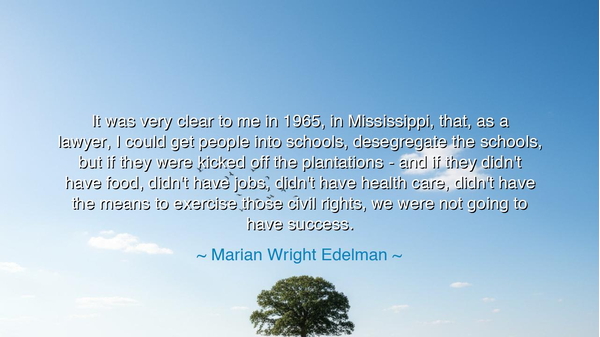
It was very clear to me in 1965, in Mississippi, that, as a
It was very clear to me in 1965, in Mississippi, that, as a lawyer, I could get people into schools, desegregate the schools, but if they were kicked off the plantations - and if they didn't have food, didn't have jobs, didn't have health care, didn't have the means to exercise those civil rights, we were not going to have success.






The great advocate and moral visionary Marian Wright Edelman, whose life has been a hymn to justice, once spoke these words of profound truth: “It was very clear to me in 1965, in Mississippi, that, as a lawyer, I could get people into schools, desegregate the schools, but if they were kicked off the plantations—and if they didn’t have food, didn’t have jobs, didn’t have health care, didn’t have the means to exercise those civil rights, we were not going to have success.” In this reflection lies both the wisdom of struggle and the depth of understanding born from suffering. She speaks not as a theoretician, but as a witness to the battlefield of human dignity. Her words reveal that freedom is hollow without sustenance, and that justice cannot thrive where hunger reigns.
In the mid-twentieth century, the soil of Mississippi was stained with both the sweat of labor and the tears of oppression. Though the laws of the land were being rewritten to honor equality, the structures of poverty and power still bound the poor, especially Black families, in chains no less cruel than those of the past. Edelman, a young and brilliant lawyer, came to see that the struggle for civil rights was not a single battle but a web of interwoven injustices. To open the school doors to a child was noble, but meaningless if that child had no home, no meal, no doctor, no stability. Her words remind us that civil rights without economic rights are but an empty promise, a freedom starved before it can speak.
The origin of these words lies in her time as a defender of the poor in the Deep South, where she saw victory in law but defeat in life. In 1965, as a young attorney with the NAACP Legal Defense Fund, she fought to dismantle the barriers of segregation. Yet after winning in the courtroom, she saw families cast out of their homes by white landowners in retribution. Children, once promised education, found themselves hungry and homeless. The law had granted them rights, but society denied them the means to live them. It was then that Edelman realized the truth: that justice cannot be decreed from parchment alone—it must be nourished by bread, shelter, and care.
History bears witness to this principle across all ages. Consider the Reconstruction era after the American Civil War. Enslaved people were declared free, but without land, livelihood, or protection, their freedom was fragile. They were forced again into dependency, their rights crushed under the weight of poverty. Centuries earlier, in ancient Rome, the philosopher Seneca had warned that laws are but “spider webs”—they catch the weak, but the powerful break through them. So too, in Edelman’s time, the letter of the law could not shield the powerless from hunger and neglect. Real freedom, she teaches, must be fed; it must live in the body as well as the spirit.
In this truth lies the enduring tension of civilization: that we celebrate liberty while denying the conditions that sustain it. To proclaim equality while ignoring hunger, joblessness, and lack of health care is to speak of light while leaving others in darkness. Edelman understood that the foundation of civil rights is not only the ballot and the classroom, but the full dignity of human life—the right to thrive, not merely survive. Her insight transforms the meaning of justice itself: it is not an abstract principle, but a living harmony between moral law and material well-being.
Her life thereafter became the embodiment of this belief. Through her founding of the Children’s Defense Fund, she sought not only to change laws but to heal the wounds that laws alone could not reach. She worked to ensure that every child, regardless of color or wealth, had food, education, health care, and a chance to live with dignity. In this, she became not merely a lawyer, but a builder of the moral infrastructure of society. For what use is the right to learn if one’s stomach is empty? What use is the right to vote if one’s voice is silenced by poverty? Edelman’s vision stretches beyond the courtroom—it is the vision of a world where freedom and sustenance walk hand in hand.
The lesson, then, is timeless and universal: rights mean little without resources, and justice without compassion is a hollow victory. True reform must not only lift the law but uplift the life. In our own time, when inequality still casts its long shadow, her words call us to act—not merely as lawmakers or dreamers, but as caretakers of one another. Feed the hungry. Heal the sick. Support the laborer. Defend the vulnerable. For only when the body is sustained can the soul truly rise.
So remember, O seeker of truth, the wisdom of Marian Wright Edelman: that the fight for justice is not won by words alone, but by the daily work of compassion. Civil rights must be lived, not only written. To lift a person from hunger is to defend liberty; to provide health care is to protect the sacred right to life; to ensure work and education is to plant the roots of lasting freedom. For the tree of justice cannot grow in barren soil—it must be watered with empathy, nourished by action, and guarded by love.






AAdministratorAdministrator
Welcome, honored guests. Please leave a comment, we will respond soon